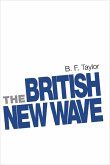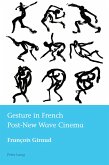The Toronto New Wave cinema that emerged in Canada in the 1980s spawned the careers of David Cronenberg, Don McKellar, Vincenzo Natali, Patricia Rozema, Sarah Polley, and many other unsung Canadian auteurs who produced films that betray anarchistic philosophies and apocalyptic propensities. This book recognises the intersection of anarchist-apocalyptic themes that the movies stage and interrogate, as it develops a new analytical paradigm that is consonant with the Canadian film production exigencies in which the Toronto New Wave was immersed. Chapters include discussions of historical contexts and auteur interviews, combined with sophisticated film analyses, to explore key themes within the Toronto New Wave. Topics include David Cronenberg's earliest films and the anarchist-apocalypse effect they engendered; Don McKellar's cohort of collaborators and the anarchist idea of "kissing this world goodbye"; and the anarchist-apocalyptic critique of cybernetic technology. The book also examines Vincenzo Natali's anarchist-apocalyptic critique of industrial technology and class-based incarceration; films and auteurs dedicated to anarchist-queering and anarchist-gendering the apocalypse; including representations of zombies and the end of time in post-millennium neo-TNW films and beyond. The text's eloquent dance with film studies' admixture of theory, history, and analyses is a ballet of insight and essential reading for anyone interested in the study of film and the exciting anarchist-apocalyptic contributions made to it by the Toronto New Wave and some of its progeny. The idea of a pending social apocalypse is a prescient issue in contemporary cinema theory and this study offers an original approach to issues keyed to anarchist values and apocalyptic revelation in an historically important but under-represented Canadian filmmaking group.
Hinweis: Dieser Artikel kann nur an eine deutsche Lieferadresse ausgeliefert werden.
Hinweis: Dieser Artikel kann nur an eine deutsche Lieferadresse ausgeliefert werden.








